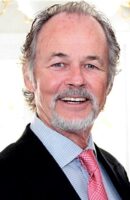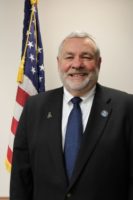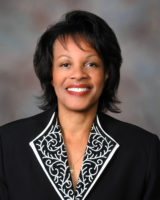
Spotlight on Community College Leaders: Fayetteville Technical Community College Trustee Billy Wellons
By Ashley Blizzard, NCACCP/NCACCT Communication Coordinator & Events Manager
A member of Fayetteville Technical Community College’s Board of Trustees for 17 years now, Billy Wellons admits that the college’s board and the Executive Board of the NC Association of Community College Trustees are the only two boards on which he now serves. The reason? Because he feels they really make a difference.
Wellons, who is in the real estate, development, property management, hotel and Harley Davidson business, is no stranger to board participation. However, after having served on many boards over the years, he finally made the conscious decision to only serve where he knew he could make an impact. The community colleges, he had discovered, was where that could occur.
Wellons said serving on the college’s board has given him a deeper perspective of what is around him. He has seen the years of opportunities and challenges faced by students and communities alike. It has been fulfilling for him to see students succeed and then become important contributing factors to the economy and to society.
Two major concerns Wellons sees the community colleges facing now are both finance related. First, he sees where community colleges need ongoing funding from the state. Secondly, Wellons believes community colleges need to be able to maintain flexibility in our financial services to an ever-changing population. “People are always moving and shifting…and they need support and encouragement. That’s part of what we do in our community college system. We help families face difficult circumstances [they] face in life,” said Wellons.
Community colleges are important to Wellons because he has seen the value community colleges provide to its students. Wellons shared a story in which one of his own employees was encouraged to go back to school when the employee attended his daughter’s graduation at FTCC. At the commencement ceremony, Wellons was one of the speakers. Wellons was unaware that because of his speech, his own employee made the decision to enroll at the community college to further his education. Cases like that prove the importance of community colleges to Wellons. Wellons said that deciding to go to the community college provides hope and greater opportunities for personal and professional fulfillment for those who may not have the resources necessary for success.
As a trustee, Wellons was surprised to learn how the community college accepts everyone—young and old, single parents, working parents, and those who may be challenged academically or financially. “We educate and train people to do real work in all trades and form our local communities and economy,” said Wellons. One thing that has really surprised Wellons is when the college has had its students speak at events and the students share how the school has treated them like a family. “The students really appreciate that,” he said.
During Covid, Wellons admits that keeping that sense of family and community has not been easy because the college is doing it from an absentee mentality. However, proper funding certainly helps. He praised the numerous online classes the college provides, even before the pandemic. Due to the fact that so many of FTCC’s students are in the military, many of its students are stationed all over the world. The ability for the college to provide them flexible, online classes with accommodating professors has given those students that sense of community.
Wellons is most proud of the way in which FTCC works with Fort Bragg. Wellons said the Fort Bragg Army General calls the college a “force multiplier” with the work the school does to train and educate our military. In military terms, the force multiplier is the factor that gives people or weapons the skills necessary to make greater achievements than they would without it. “At the heart of all of it, our people work in concert with our community that forms the magic that makes it all happen,” said Wellons. For the 17 years he has been on the college’s board, he said they have never had a trustee who had his/her own agenda. He is proud the college has a president and board who “work hard in working together.”
Wellons’ advice to new trustees strongly relates to the pride he has in his FTCC board. “Don’t come on the board unless you are serious about being a good trustee,” he says. “Don’t do it just because it’s an appointment. Come in with an attitude of harmony.” He also says to be involved and participate. With the onset of the Covid-19 pandemic, Wellons said advice he would share with new trustees is that you have to be flexible, you have to listen to your leadership, and you have to be creative and innovative. He said trustees have to demonstrate they care.
In order for the college to accommodate new technologies, one advancement Wellons would like to see at FTCC is a continued refinement and development of its information technology infrastructure. He would also like to see that FTCC’s faculty and staff are people who have been in the “real world” so they can share that experience with the students. Lastly, Wellons wants to continue to have the best equipment for instruction purposes. In a nutshell, he said, “We want to lead the way!”
When asked about his hobbies, Wellons’ first response was, “How long have you got?” His hobbies vary widely and include collecting guns and knives, bird hunting, his ownership of 20 Tennessee Walking Horses, photography (although he enjoyed it more before digital photography became popular), and a love of all kinds of music. For 10 years, Wellons was even part of a rhythm and blues band (named the Men of Distinction) that headlined for numerous Motown groups.
His favorite place to relax is at a family farm in Falcon, NC. There he can hunt, fish and ride his Tennessee Walking Horses. Wellons also said he relaxes when he rides motorcycles, which he has been doing since he was 18 years old. A partner and owner in two Harley Davidson dealerships, Wellons said he has had two very memorable vacations. The first vacation was when he was 20 years old and his dad took his family on a 30-plus day international trip that began in London. Wellons and his family traveled as far east as Moscow, as far south as Cairo and ended the trip in Switzerland with stops along the way that included Paris, Warsaw, Tel Aviv, Jerusalem, Rome and Athens.
His other memorable vacation was when he and one of his best friends rode 12,680 miles over the course of 40 days…on motorcycles! Their route began in Fayetteville, North Carolina, where they traveled into parts of Canada, then back into the United States where they journeyed across the northern states of the United States, back into Canada and then to California. Then after making several other stops that included Lake Tahoe and the Salt Lake Flats, they traveled to Milwaukee and joined 350,000 people for the 100th anniversary celebration of Harley Davidson.
In spite of the fact that it sounds like Wellons has “done it all,” he actually does have something left on his bucket list. He would like to rent a house and spend a couple of weeks in a village on the coast of Italy.
Some of the best advice Wellons ever received came from his dad. Wellons stated that throughout his life, he was always worried about his competition. However, Wellons said his dad told him that if he got up before everyone else and if he worked harder than everyone else, he would beat the competition every time. Wellons also said his dad would not ever accept the words, “I can’t.” According to Wellons, that mentality has given him a positive attitude that he could do what he wanted to do. Lastly, Wellons’ dad told him, “Put God first, family second, work hard, and you’ll be a good man.”
Wellons has several life accomplishments of which he is proud. First, he is an Eagle Scout. Second, he is the only one in his family who graduated college. He is also proud of his accomplishments as a businessman. Finally, Wellons said he is proud of his hard-working wife, who has owned her own hair salon for 28 years, as well as his two sons and one daughter.





